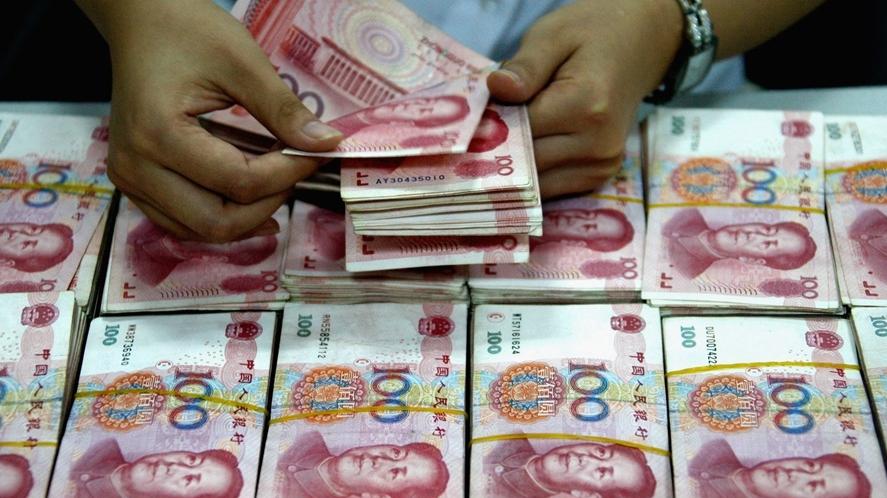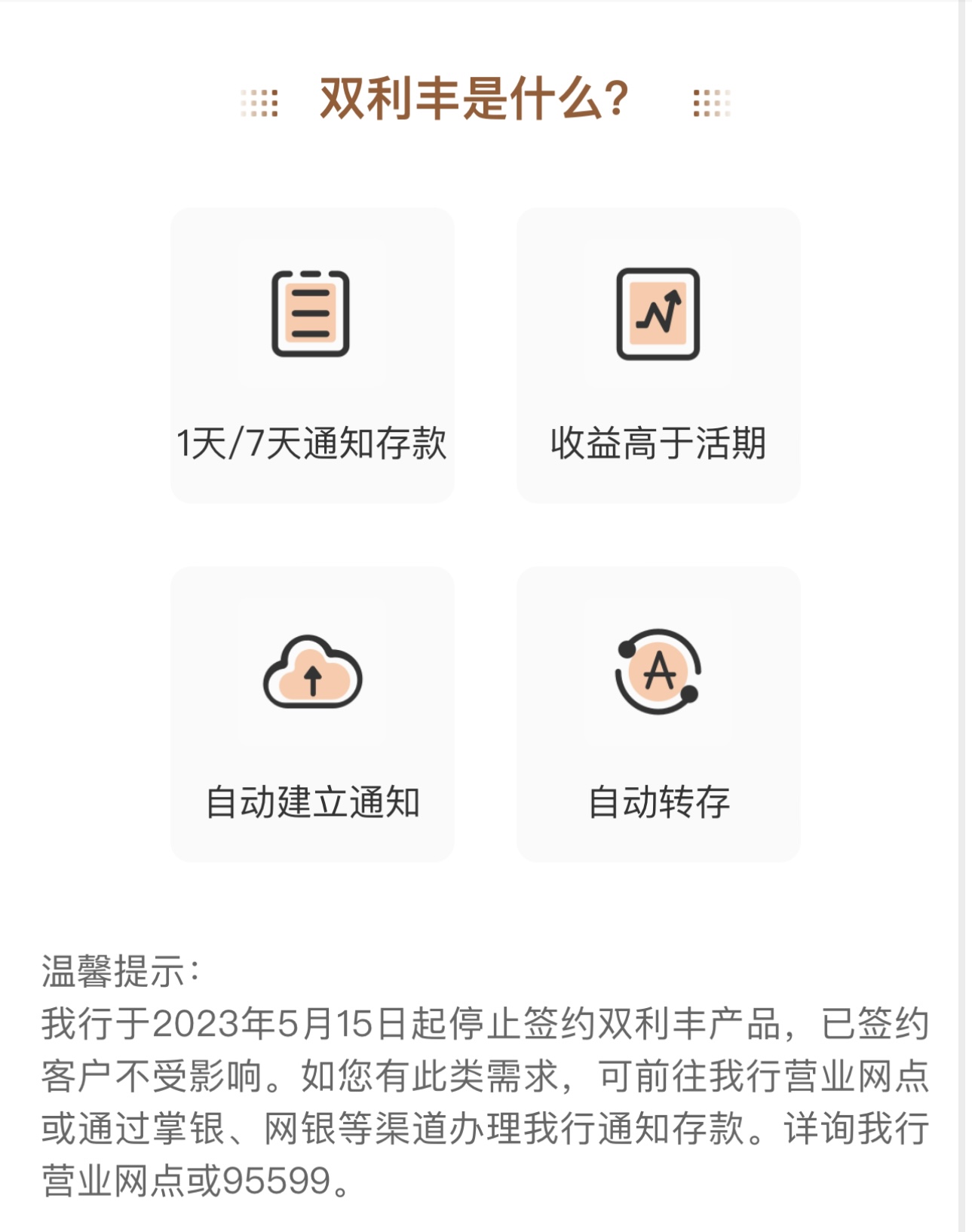The interest rate ceilings for two types of deposits have been lowered from now on, and many banks have suspended the sale of "smart notice deposits" products.

On May 15th, a number of banks lowered the interest rates of notice deposits and agreed deposits, and some banks "officially announced" to suspend the sales of smart notice deposits.
It is understood that since May 15, the self-regulatory ceiling of bank agreement deposits and notice deposits has been lowered, with the benchmark interest rates of the four major banks increased by 10 basis points and those of other financial institutions increased by 20 basis points.
A number of banks suspended smart notice deposit business.
It is worth noting that a number of banks suspended the sales of smart deposit products on the day when the self-regulatory ceiling for agreed deposits and notice deposits was lowered.
Ping An Bank announced that since May 15th, 2023, the interest rates of daily deposit-call deposit products and smart deposit-call deposit products have been adjusted, in which the one-day and seven-day execution interest rates of most branches are 20bp higher than the benchmark interest rate, that is, the adjusted one-day and seven-day execution interest rates are 1% and 1.55% respectively, and the benchmark interest rates are 0.8% and 1.35% respectively. The executive interest rates of Hangzhou, Ningbo and Wenzhou branches are all 15bp higher than the benchmark interest rate, that is, the adjusted one-day and seven-day executive interest rates are 0.95% and 1.50% respectively.
Ping An Bank also said that since May 14th, the sales of "smart notice deposit" products will be suspended. By then, the "smart notice deposit" products will no longer support new signing in the online (pocket APP) channel and offline (outlet counter system and remote counter banking system) channel of the bank; If the "smart notice deposit" product has been purchased before the suspension of sales, the stock business can still continue to handle product withdrawal, inquiry, contract cancellation and other businesses in various channels of the bank.
Coincidentally. Dongying Bank also issued a notice on the suspension of the smart notice deposit business, saying that in order to implement the measures of the People’s Bank of China to deepen the interest rate marketization reform, in accordance with the relevant guidance requirements of the People’s Bank of China to improve the formation and transmission mechanism of market-oriented interest rates, the smart notice deposit business will be suspended from May 15, 2023.
Although the state-owned banks did not announce that they would suspend notice deposits in official website, on the mobile APP side, some banks showed that they would suspend sales.
The Agricultural Bank App shows that the smart notice deposit product "Shuanglifeng" in the deposit area of the bank stopped signing contracts on May 15, and the signed customers were not affected. The Agricultural Bank of China said that if there is such demand, it can go to the business outlets or handle notice deposits through channels such as palm banking and online banking.

Agricultural Bank App "Shuanglifeng" Deposit Product Page
On the other hand, the CCB App shows that the products of "Pay-as-you-go deposit" and "Settlement-as-you-go deposit" under the featured deposit list have also been suspended for sale, and they are only available for inquiry at present, and the "Personal Notice Deposit One-account Pass" under the notice deposit list also shows that they have been suspended for sale.
In addition, the interest rates of call deposits and agreement deposits of small and medium-sized banks have been reduced by 55BP.
Guilin Bank announced that in order to promote the marketization of deposit interest rates, on May 15, 2023, the implementation interest rates of some deposit products were adjusted, and the adjusted products were notice deposits and unit agreement deposits.
Among them, the interest rates of call deposits for various maturities are lowered by 55BP, and the executive interest rates of one-day and seven-day call deposits are adjusted from 1.55% and 2.1% to 1.0% and 1.55% respectively. The agreed deposit interest rate of the unit is lowered by 55BP, the benchmark interest rate is 1.15%, and the implementation interest rate after adjustment is 1.35% (the implementation interest rate before adjustment is 1.90%).
According to the current benchmark interest rate of the central bank, the benchmark interest rate for agreed deposits is 1.15%, the one-day call deposit is 0.8%, and the seven-day call deposit is 1.35%.
What is the impact of lowering the self-discipline ceiling of two types of deposit interest rates?
What is the impact of lowering the self-regulatory upper limit of interest rates for bank agreement deposits and notice deposits on individuals and enterprises?
Luo Zhiheng, chief macro analyst of Yuekai Securities, pointed out in the research report that agreement deposits belong to public business, and notice deposits have both public business and personal business, but they all have certain deposit thresholds. Generally speaking, agreement deposits and notice deposits are mainly corporate demand deposits, which have little impact on ordinary people. For enterprises, there will be some interest losses, but if the deposit and loan interest rates can be lowered, it will also help to stimulate enterprise investment and reduce financing costs.
Notice deposit and agreement deposit are both relatively high-priced deposits.
Call deposit is a kind of deposit with no agreed term, and it is necessary to notify the bank in advance and agree on the date and amount of withdrawal before withdrawal. No matter how long the actual deposit period is, notice deposits can be divided into two types: one-day notice deposits and seven-day notice deposits according to the length of the depositor’s notice period in advance.
Agreement deposit refers to a deposit method in which an agreement deposit account with dual functions of settlement and agreement deposit is opened on the unit basic account, general deposit account or special deposit account, and the basic deposit amount is agreed, and the part in the agreement deposit account that exceeds this amount will be paid separately by the bank according to the agreement deposit interest rate.
Regarding the adjustment of the deposit ceiling, Zhongtai Securities pointed out that due to the superposition of multiple factors, such as high excess savings of residents, slow recovery of consumption, and the pressure of bank interest margin, on the one hand, the regulatory authorities have the incentive to continuously push down the deposit interest rate to ensure the reasonable interest margin range of banks, thus increasing the incentive for banks to provide credit support to the real economy. On the other hand, the banks themselves, the capital market and wealth management are slowly picking up, residents’ risk aversion is still at a high level, and deposits continue to increase. On the basis of less pressure on the debt side, they also have the incentive to lower the deposit pricing to protect the spread.
Minsheng Securities tends to think that this adjustment is still more about continuing this round of deposit interest rate reduction in September last year, and completing the closed loop of deposit interest rate adjustment to improve the profit margin of banks.
"Since the establishment of the deposit interest rate mechanism, the two rounds of interest rate reduction have focused on demand and time deposits, actually ignoring the interest rate adjustment of these deposits between demand and time deposits. At present, it is necessary to adjust the interest rate ceilings of notice deposits and agreed deposits at one time to ensure the effectiveness of deposit interest rate reduction." Minsheng Securities pointed out that the level of net interest margin of state-owned banks in the first quarter hit a record low. When the interest rate is lowered, it will help reduce the debt cost of banks and promote the enthusiasm of banks to provide credit.